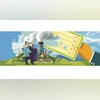India will have to prepare itself in future to deal with potential non-tariff and unilateral duty-related barriers like the EU carbon tax, a senior government official said on Wednesday.
Director General of Foreign Trade (DGFT) Santosh Kumar Sarangi said that countries like the US and the European Union (EU) are trying to boost their domestic manufacturing through such measures.
"So the US has been trying to boost its domestic manufacturing through the Inflation Reduction Act and CHIPS Act, the EU is trying to do it through CBAM (Carbon Border Adjustment Mechanism)...deforestation regulation is another mechanism of putting non-tariff barriers on goods coming from developing economies.
"So both the combination of non-tariff measures as well as potential tariff measures in clear violation of WTO (World Trade Organisation) commitments is something which India has to brace up in future to deal with," Sarangi said.
He was speaking at CII's export competitiveness conclave.
Asked about US President-elect Donald Trump's threat to impose higher duties, he said one has to wait and watch to see the fine-prints of these measures.
More From This Section
The DGFT said that it will be "very" difficult to decipher from one or two sentences which Trump is making.
"But what I have understood from what he was saying is that his main intent is that reciprocity will matter in future, he said.
He noted that such measures would be a violation of WTO norms but the last Trump administration has imposed high duties on certain products on the grounds of national security.
The DGFT said that it will be "very" difficult to decipher from one or two sentences which Trump is making.
"But what I have understood from what he was saying is that his main intent is that reciprocity will matter in future, he said.
He noted that such measures would be a violation of WTO norms but the last Trump administration has imposed high duties on certain products on the grounds of national security.
"So one will have to wait and watch and see. There are many areas where we have tariff peaks but we don't necessarily export to the US," Sarangi said.
For example in agriculture, India has high duties but it does not export necessarily to the US market.
"So if the US will impose duties on that, it will not harm us in a major way but there would be a few items where this reciprocal thing might impact us," he said adding one has to wait for the fine print before guessing an impact.
The DGFT also said India is still an importer of capital goods in sectors like dairy, textiles and pharma as the country lacks technology and for that industry has to focus on R&D.
He added that the commerce ministry is taking steps to boost exports through e-commerce medium.
China's e-commerce exports stood at about $300-350 billion annually, whereas India shipments through this medium are only $5-7 billion per year. It is estimated that there are about 1,500 Chinese warehouses in the US for such exports.
As per estimates, India's e-commerce exports may reach $200-250 billion by 2030 if conducive ecosystem is developed.
"We need to ensure that e-commerce exports are cleared in the fastest possible time. In China, a consignment is cleared in less than a minute, so that is the speed we need," Sarangi said India also has to provide customs and security clearances in less than a minute.
He added that access to finance for these exporters is a big challenge and banks are generally reluctant to deal with them.
The commerce ministry is talking to EXIM bank to create financial instruments through which banks will be encouraged to support e-commerce exporters.
Branding and marketing of products like the way Switzerland does is also key to boost shipments.
)